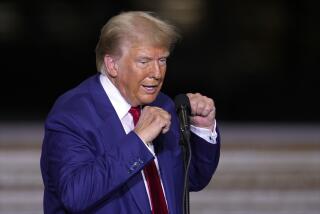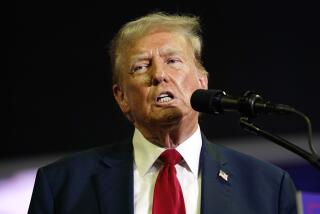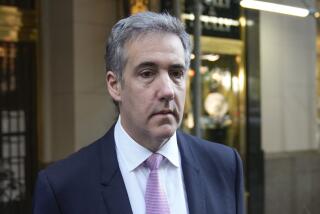Whitewater Subpoena for Clinton OKd
- Share via
WASHINGTON — A federal judge on Monday ruled that President Clinton could be subpoenaed to testify at an upcoming criminal trial in Little Rock for Arkansas Gov. Jim Guy Tucker and two other defendants on fraud charges stemming from independent counsel Kenneth W. Starr’s investigation of the Whitewater scandal.
The president promptly indicated that he will comply with the order. In response to the ruling by U.S. District Judge George Howard Jr., Clinton attorney David E. Kendall issued a statement saying that “it is the president’s intention to cooperate in an appropriate fashion.”
Clinton’s lawyers decided not to resist a subpoena, according to White House sources, because they did not want the president to be accused of failing to cooperate in the primary criminal trial growing out of his joint investment with defendants Susan and James B. McDougal in Whitewater. The trial begins March 4.
While neither the president nor First Lady Hillary Rodham Clinton has been charged in connection with the couple’s investment in the Whitewater land venture, both have previously been interrogated by Starr. Mrs. Clinton recently obeyed a subpoena from a grand jury hearing the case.
The judge told defense lawyers that the president would not necessarily be required to testify in person. As a result, lawyers in the case were likely to agree to take Clinton’s testimony by some electronic means, such as by videotape or a live satellite hookup.
It is unusual--but not unprecedented--for a sitting president to testify in a criminal trial. President Thomas Jefferson testified in writing in the famous murder trial of Aaron Burr, and Presidents Gerald R. Ford and Jimmy Carter also provided testimony in criminal trials during their tenure.
In addition, former President Ronald Reagan testified by videotape in the 1990 Iran-Contra trial of former National Security Advisor John M. Poindexter.
The judge’s ruling is a major victory for defendant Susan McDougal, whose lawyer submitted a petition last week arguing that he must have an opportunity to question the president during the trial to rebut the testimony of the government’s star witness, David Hale.
*
Hale, a former municipal court judge, is expected to testify that he was acting under pressure from Clinton, then governor of Arkansas, when he made an improper loan of $300,000 from his federally backed small-business investment corporation to McDougal and her then-husband, James B. McDougal.
Clinton has repeatedly denied Hale’s account, which forms the basis of Starr’s case of fraud against the McDougals and Tucker. Clinton’s testimony will serve as the centerpiece of defense efforts to undermine Hale’s credibility.
Hale also contends that after he made the loan, he was told by Clinton that the McDougals had failed to use the money to settle as promised some of the accounts of Madison Guaranty Savings & Loan before a visit from bank examiners. The thrift later failed, costing taxpayers about $60 million.
The president also has denied allegations that he and his wife benefited personally from the loan when the McDougals passed $30,000 of the money through the account belonging to the Whitewater land venture in which the Clintons and McDougals were partners.
Susan McDougal’s lawyer, Bobby McDaniel of Jonesboro, Ark., told the judge that he needed to question the president because Clinton was the only other person who was privy to the conversations that Hale alleges he had before granting the loan.
Although the independent counsel has previously interrogated the president about this case, McDaniel noted that no defense attorneys were present to ask questions relevant to their case. He also asserted that Clinton’s previous answers might not be sufficient if Hale raised issues that were never put to Clinton.
Starr supplied the president’s deposition to the defendants about 10 days ago in response to a judge’s order to hand over all exculpatory information to the defendants.
Clinton’s willing testimony in this case bears no relationship to his refusal to be deposed by Paula Jones, the former Arkansas state worker who has sued him for sexual harassment. Clinton has resisted that suit on grounds that the Supreme Court has ruled a sitting president cannot be sued. The case remains on appeal.
In the Jones case, Clinton is a defendant. In the Whitewater case, he is a witness.
BACKGROUND
President Clinton, if he testifies in next month’s Whitewater trial, will not be the first sitting president to provide testimony in a criminal case. In 1975, President Gerald R. Ford gave a videotaped deposition in the trial of Lynette “Squeaky” Fromme, convicted of trying to assassinate him. President Jimmy Carter provided videotaped testimony in the prosecution of a Georgia state senator and again in a grand jury investigation of financier Robert Vesco. Two presidents testified in criminal trials after they left office: President Richard Nixon testified in person in the Watergate cover-up trial, and President Ronald Reagan testified by videotape in the 1990 Iran-Contra trial of former National Security Advisor John M. Poindexter.
More to Read
Sign up for Essential California
The most important California stories and recommendations in your inbox every morning.
You may occasionally receive promotional content from the Los Angeles Times.













